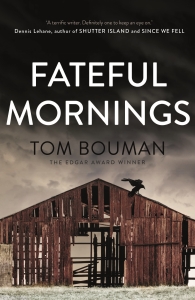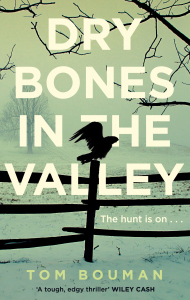Fateful Mornings – Tom Bouman
 No debut novel is easy to follow up on, especially one as convincing as ‘Dry Bones in the Valley’, but with his second effort, ‘Fateful Mornings’, US author Tom Bouman has well and truly risen to the challenge, producing a work of rare power, intensity and depth. A work which, incidentally, is also a cracking crime fiction read.
No debut novel is easy to follow up on, especially one as convincing as ‘Dry Bones in the Valley’, but with his second effort, ‘Fateful Mornings’, US author Tom Bouman has well and truly risen to the challenge, producing a work of rare power, intensity and depth. A work which, incidentally, is also a cracking crime fiction read.
There are plenty of great crime novels – take for example Simenon’s Maigret stories – which excel for their characterisation, atmosphere and sense of place, while remaining clearly within the genre’s classic boundaries. Novels which are well and truly only about a crime and its investigation, and which are taken up another notch in the literary stakes by sheer authorial brilliance.
In ‘Fateful Mornings’ there is a crime – at least a presumed one – in the first chapter, there is a lead investigator, and there very much is an investigation: Penny Pellings, a young woman, with a troubled past of drug abuse, is reported missing by her semi-alcoholic boyfriend Kevin O’Keefe. Henry Farrell, the one-man police department of Wild Thyme, in rural Pennsylvania, and the protagonist of ‘Dry Bones in the Valley’, steps in to search for her, also looking into O’Keeffe’s claim that he shot someone the night Penny disappeared. And investigate he does, moving first in the local milieu he knows so well, among farmers, constructions workers and petty and not so petty criminals (meth labs and heroin deals have come into the area on the back of the fracking money bandwagon), and then going over into New York state when the body of a young man, possibly murdered, is found in a river, an ex-con suspected of drug dealing who lived at the premises where Kevin O’Keefe may or may not have shot someone on that fateful night.
All the ingredients of a good crime novel are there, and expertly handled by Bouman. But the narrative in ‘Fateful Mornings’ encompasses far more than that, going well beyond a crime novel’s conventional pale. It is deeply concerned with personality and place, elements which the author is confident enough to weave into the story’s fabric. It’s hard work, doing so without losing the readers’ focus on the investigative thread, but Bouman does it in style. It’s also painstaking work, a matter of details: how characters react, how they speak, what drives them, all the more difficult because Bouman does it by accumulation rather than explanation. But the resulting tapestry is truly remarkable, head and shoulders above many a contemporary crime novel while still retaining the genre’s hallmarks of pace and trickery.
Two elements for me stand out in ‘Fateful Mornings’. First and foremost, the lead character. Henry Farrell is an odd one for a law-enforcement officer: quiet, almost unassuming, and as driven as the deceptively drowsy life of his patch would allow him. But then Wild Thyme, his patch, isn’t any ordinary patch. It’s forest and glens and lakes and fracking land, and people who live relatively simple but tough lives in this Pennsylvania backwater. Henry isn’t a happy man, he has heavy personal baggage, but he seems to be content with his lot, and the ravages of the past detract nothing from his personal integrity and gritty law enforcement approach.
Content doesn’t necessarily mean innocent of course. Farrell, widowed and single almost by choice, isn’t above an occasional joint or an affair with a married woman, one which will at some stage threaten to distract him from this particular investigation. But Bouman resists the temptation of turning Farrell into some slightly rustic John Rebus, and endows him with a deep-seated, credible moral compass, albeit one which isn’t above all that life can throw at him from left field.
In this, Henry Farrell is so much a ‘normal’ human being that you can’t help but appreciate him. And appreciate Bouman’s ability in rendering him without so much as a single line of description: the sharp sobriety of Henry Farrell’s first-person narrative is as good a way to portray him as several pages of tell. The things he notices, nature above all, the spare dialogue with its clipped sentences, his reserve and underlying melancholy.
The second bolster of this very fine novel is, unsurprisingly, its plot. While ‘Dry Bones in the Valley’ was relatively self-contained, in terms of locale and number of characters, ‘Fateful Mornings’ strays further afield in both respects. The search for Penny Pellings first goes hand in hand with the investigation on the young man found dead in the river, then quickly branches out, away from Wild Thyme into New York state, with Farrell becoming unwittingly enmeshed into a coordinated effort by state and local agencies targeting drugs dealing and a horrific child prostitution ring. The plot becomes labyrinthine yet Bouman, and Farrell, manage to stick to it, not without taking a number of risks.
And just as Henry Farrell, despite his no-nonsense yet somehow charmingly naïve take on life, cannot refrain to pull a few punches, so does Bouman. The second part of the novel gradually plunges the reader in a very uncomfortable place. A bleak America that is neither the home of brave nor the land of the free, as Farrell discovers wading through the seedy underbelly of Binghamton, New York, and its environs – one that is just a derelict former shopping mall away from dignified suburbia. What Bouman shows us is a place of lost hope, ironically once dubbed ‘the Valley of Opportunity’, where countless people now seem to live a hollowed-out life with little yearning for improvement. A place so full of despair it is little wonder that some of its denizens take more than one wrong turn in life.
The paths Henry Farrell has to tread in this once-industrial USA which has lost nearly all of its grandeur contrast sharply with the pristine, savage beauty of the Pennsylvania landscape. He hangs suspended in there, risking a lot more than his reputation as a law-enforcement officer. Quietly, he dares, just as Bouman does, and ultimately, it’s this discreet courage that makes him such as satisfying character, and ‘Fateful Mornings’ such a brilliant novel.





